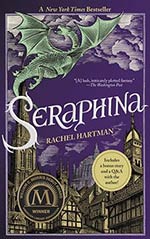
![]() MMOGC
MMOGC
7/5/2013
![]()
I've always marveled and pondered the many ways authors handle the subject of dragons. In Seraphina, they are intelligent, possess advanced technology, and have a magical ability that lets them take human form. The book takes place in a world where humans and dragonkind exist in a constant state of mistrust. After warring with the humans for time eternal, the leaders of the two races had finally come together to agree upon a peace treaty.
Now forty years have passed, and while dragons walk amongst humans at court and in their cities as scholars and ambassadors, bitter feelings still exist between the two sides. The tension reaches a fever pitch in the days before the dragonkind leader arrives to commemorate the treaty's anniversary, and a human prince of Goredd is found dead, his head missing--presumably eaten by a dragon.
These events hold terrible implications for our protagonist Seraphina Dombegh, a half-dragon hybrid who has struggled to hide her secret for most of her life. Circumstances draw her into the murder investigation, and she finds herself working with handsome Prince Lucian, Captain of the Queen's Guard, despite her position as the court musician's assistant. With the day of the anniversary celebrations fast approaching, they have limited time to tease apart a dangerous conspiracy plot.
The world-building in this book is phenomenal; as in, a lot of thought seems to have been put into every aspect of the setting. For example, its rich history adds a lot to the story, and to a certain extent, the reader has to understand the significance of past events to fully appreciate the impact they have on the present. Then there is the complex religion, which encompasses a fair number of saints to which the people of Goredd look to guide them. The religious aspect certainly isn't central to the book, but at the same time, it adds a layer of context to the story and characters, making them feel more refined.
Then there are the dragonkind and their culture. Let's just say when it comes to emotional suppression and denial of their feelings, the dragons in Seraphina make the Vulcans on Star Trek look like cuddly puppies. The idea that they can look like humans is also very interesting, if not wholly original, but what I found amusing are the dragons' general impressions on having to take human shape; I just wished there were more details on the magic involved during the actual changing process.
And speaking of magic, on the whole, the concept of it in this book is quite abstract. Seraphina, for instance, has to regularly "tend a garden" in her mind in order to control the debilitating visions that overtake her, thanks to the powers she inherited from her unusual parentage. If you're anything like me, it'll take some time to wrap your head around this bizarre idea, which really is more a part of Seraphina's abilities than a metaphor, which I know it sounds like.
So why am I not absolutely crazy for this book, like I should be? Unfortunately, some books that by all rights I should adore are diminished in my eyes by the characteristics of the main protagonist, and this was the case for Seraphina. Try as I might, I just couldn't connect with the eponymous heroine as I'm usually not a fan of the "wallflower-type" character. Granted, Seraphina has all the reasons in the world to be the way she is, but she's still a bit too far on the meek side of things for my tastes. It's true she displays moments of strength and determination, but then also wallowed in her self-pity one too many times for me to truly engage with her narrative.
Don't get me wrong, this book was a wonderful read and I'm glad I picked it up, but being able to like the main character is a biggie for me, and it was that one thing that prevented me from giving it a higher rating. Overall, however, Seraphina is an impressive debut featuring excellent world-building and very imaginative elements. It's classified as Young Adult, but a wider audience could definitely appreciate this.
http://bibliosanctum.blogspot.com